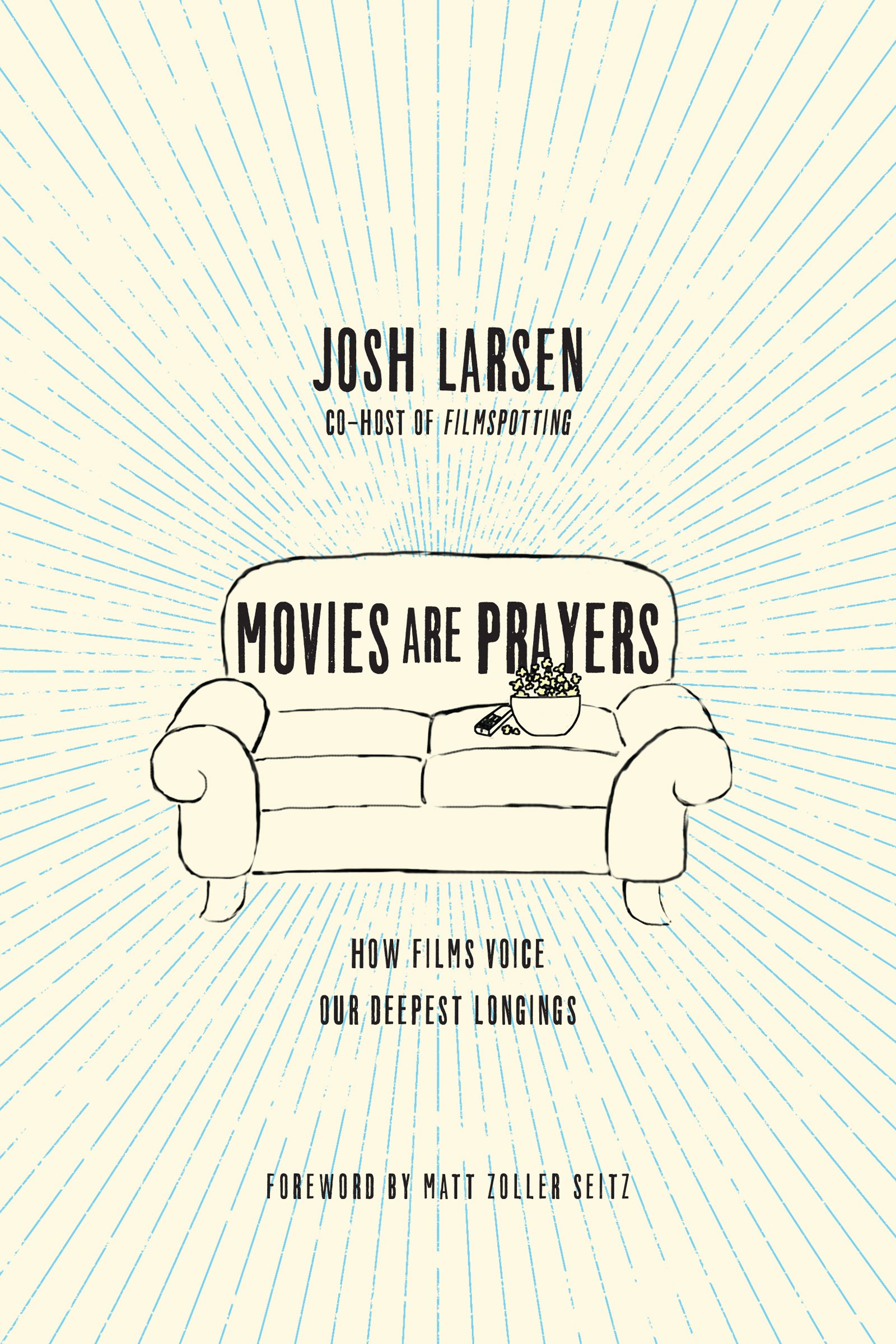First, a disclaimer feels appropriate: Josh Larsen is a member of the organization of which I am the Vice President, the Chicago Film Critics Association (and several contributors to this site are members as well). Having said that, we are professional colleagues more than friends, and I don’t think that aspect clouds how highly I think of “Movies Are Prayers: How Films Voice Our Deepest Longings,” one of the most engaging and interesting takes on why we go to the movies that I’ve read in years. Another disclaimer: this site’s Editor-at-Large Matt Zoller Seitz wrote the foreword for this book. Hopefully, that just makes you want to read it even more.
Readers of a site such as this are probably familiar with the concept of a movie theater as a place of worship. It is somewhere we gather with fellow followers of the Church of Cinema, sitting in the darkness and sharing something akin to a sermon. Larsen, the co-host of the excellent podcast Filmspotting and critic for Think Christian, takes this concept a step further. If one believes that every action expresses a relationship with God than it’s not hard to see film as reflective of that relationship, expressed through prayer. As Larsen writes, “In bringing together these two practices—theological reflection and film criticism—I’m engaging in what is perhaps best described as work of cultural refraction. Just as holding a prism against a slit of sunlight reveals a variety of colored beams, this book might help our understanding of both God and the movies to shimmer in a new way.”
Early in his book, Larsen makes clear that this is not a view of film designed to judge Hollywood for its sin—there will be R-rated films discussed—and his book is refreshingly devoid of what can often be a religious trap of superiority. He’s careful to present a view of cinema that never feels like it’s forcing itself on you as the only view of cinema that could possibly be accepted by someone who believes in God. And yet he also never falls into the opposite trap of trying to please everyone. It is a book that is both confident and insightful without ever feeling pretentious or demanding of agreement.
Through just under-200 pages, Larsen examines dozens of films, some more obvious choices than others but all intriguing. Of course, science-fiction has long been analyzed from a religious angle—so many of them, from “2001: A Space Odyssey” to “Alien: Covenant,” are about trying to find a creator—but did you consider “The Wizard of Oz” as a commentary on worshipping false Gods (what else is the man behind the curtain in the end?) or films about food (such as “Babette’s Feast” or “Jiro Dreams of Sushi”) as thanks for the bountiful provisions of God’s Earth? Larsen is careful to use his examples as food for thought and not full meals. One could write dozens of pages on the concept that “Do the Right Thing” is more about reconciliation than violence (consider the end scenes) but Larsen merely gives you that idea and then lets you consider it further rather than diverging for too long into one film or one concept.
Larsen’s book is divided into nine variations on “Movies as Prayers,” broken into as many chapters. For example, “Movies as Prayers of Praise” analyzes the films that reflect the thankfulness for the glory of God’s creations, including films such as “Avatar,” “Into the Wild,” and “Fantastic Voyage.” Prayer is often seen in modern terms as an act of need or request—we pray for God to grant us something—but Larsen uses the word to reflect the many different kinds of prayer. Film can be a prayer of yearning or a prayer of reconciliation or a prayer of joy or even a prayer of anger. Prayers reflect our relationship with God and that can contain as many multitudes of feeling and emotion as cinema has provided over the years.
Like only the best film books, “Movies Are Prayers” constantly finds ways to surprise even the most informed readers, offering new ways to view cinema. It’s as if Larsen is asking questions of his readers. Did you consider the grace in “Tangerine,” and the themes of reconciliation? Did you think about what “It’s a Wonderful Life” has to say about obedience? There aren’t many writers who could quote Romans 3:23 in a reading of “Trainwreck” and make it work, but Larsen does.
As someone who does what I do for a living, I feel invigorated by takes on cinema that don’t echo what we’re seeing every day on Film Twitter and major outlets, and “Movies Are Prayers” does exactly that, offering a new approach to cinema that feels fresh with each new blend of prayer and film. You don’t have to know your Bible (I don’t) or go to church every week (again, not me) to appreciate someone engaging with film on a level that you probably haven’t considered before. In a sense, this is what makes writing about art so essential in that Larsen offers a new lens with which to see something you may have viewed dozens of times before. Even if you don’t see the same refracted beams in every piece of miniature film study in the book, you have to admire the consistently fascinating colors on display.












